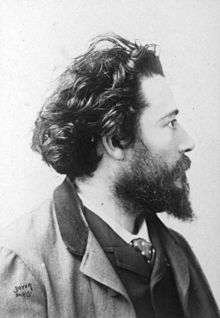Jean Aicard
| Jean Aicard | |
|---|---|
 Jean Aicard, photo ca. 1900. | |
| Born |
14 February 1848 Toulon |
| Died |
13 May 1921 (aged 73) Paris |
| Language | French |
| Nationality | French |
| Genre | Poetry |


Félix Régamey, ca. 1878.
Jean François Victor Aicard (4 February 1848 – 13 May 1921) was a French poet, dramatist and novelist.
Biography
He was born in Toulon. His father, Jean Aicard, was a journalist of some distinction,[1] and the son began his career in 1867 with Les Jeunes Croyances, followed in 1870 by a one-act play produced at the Marseille theatre.
His poems include: Les Rebellions et les apaisements (1871); Poèmes de Provence (1874), and La Chanson de l'enfant (1876), both of which were crowned by the Academy; Miette et Noré (1880), a Provençal idyll; Le Livre d'heures de l'amour (1887); Jésus (1896). Of his plays the most successful was Le Père Lebonnard (1890), which was originally produced at the Théâtre Libre. Among his other works are the novels, Le Roi de Camargue (1890), L'Ame d'un enfant (1898) and Tata (1901), Benjamine (1906) and La Vénus de Milo (1874); an account of the discovery of the statue from unpublished documents,[1]
He was elected a member of the Académie française in 1909.
He died in Paris, 13 May 1921.[2]
Selected works
- Poetry
- Les Rebellions et les apaisements (1871)
- Les Poèmes de Provence (1874)
- La Chanson des enfants (1876)
- Miette et Note (1880)
- Lemartine (1883) which received the prize of the Académie française[3]
- Le Livre d'heures de l'amour (1887)
- Jésus (1896)
- Le témoin (1914-1916)
- Novels
- La Vénus de Milo (1874)
- Le Roi de Camargue (1890)
- Notre-Dame-d'Amour (1896), online at:
- L'Âme d'un enfant (1898)
- Tatas (1901)
- Benjamine (1906)
- Maurin des Maures (1908)
- L'illustre Maurin (1908)
- Dramatic works for stage
- Pygmalion (1878)
- Othello ou le More de Venise (1881)
- Le Père Lebonnard (1889)
References
- 1 2 Chisholm 1911.
- ↑
 Chisholm, Hugh, ed. (1911). "Aicard, Jean François Victor". Encyclopædia Britannica (11th ed.). Cambridge University Press.
Chisholm, Hugh, ed. (1911). "Aicard, Jean François Victor". Encyclopædia Britannica (11th ed.). Cambridge University Press. - ↑
 Gilman, D. C.; Thurston, H. T.; Colby, F. M., eds. (1905). "Aicard". New International Encyclopedia (1st ed.). New York: Dodd, Mead.
Gilman, D. C.; Thurston, H. T.; Colby, F. M., eds. (1905). "Aicard". New International Encyclopedia (1st ed.). New York: Dodd, Mead.
- Attribution
 This article incorporates text from a publication now in the public domain: Chisholm, Hugh, ed. (1911). "Aicard, Jean François Victor". Encyclopædia Britannica. 1 (11th ed.). Cambridge University Press.
This article incorporates text from a publication now in the public domain: Chisholm, Hugh, ed. (1911). "Aicard, Jean François Victor". Encyclopædia Britannica. 1 (11th ed.). Cambridge University Press.
External links
- Works by Jean Aicard at Project Gutenberg
- Works by or about Jean Aicard at Internet Archive
- Works by Jean Aicard at LibriVox (public domain audiobooks)

| Preceded by François Coppée |
Seat 10 Académie française 1909-1921 |
Succeeded by Camille Jullian |